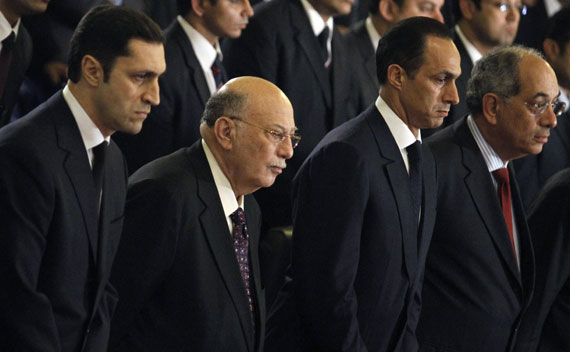Goodfellas on the Nile
More on:

In this extended season of the unthinkable becoming reality, Hosni, Alaa, and Gamal Mubarak are being detained pending an investigation into violence against protestors, corruption, profiteering, wasting public funds, and illegal accumulation of wealth. On Monday, Alaa (the lesser well-known of the Mubarak boys) and Gamal were transferred to Tora prison near Cairo. They now join former senior National Democratic Party and government officials including Safwat el Sherif, Ahmed Ezz, Fathi Sorour, Ahmad Nazif, and Habib el Adly in white prison jumpsuits. Former President Mubarak remains in a Sharm el Sheikh hospital, but the State Prosecutor and the Supreme Council of the Armed Forces insist that he is under detention. Rumor also has it that Suzanne Mubarak has undergone questioning. These developments are of extraordinary symbolic importance on two levels. First, Egyptians have been demanding accountability and bringing the Mubaraks to the dock is an obvious step in that direction. Second, it indicates the power of what is known as the “revolutionary groups” or “revolutionary youth.” On Sunday, I wrote about the competing legitimacies between these groups on the one hand and the armed forces on the other. With Gamal and Alaa in the clink, Hosni under guard, and Suzanne under investigation it seems that the revolutionaries are winning this war.
One of the Egyptians I follow on twitter declared upon hearing the news about the Mubaraks, “It’s like the army woke up and realized we had a revolution.” There is a sense—based on everything I can tell from 5,000 miles away—that now the Egyptians can move on and build a new political system. In response to the detention of Mubarak and his sons, the revolutionaries have called off planned protests for Friday. I wonder if the revolutionary youth cut a deal with Field Marshal Tantawi and his fellow commanders.
For all good news associated with detaining the Mubaraks, what exactly have the revolutionaries (“matadors of the Internet” as one friend put it) achieved? Here is my unscientific accounting:
- Arrest and investigation of the former first family;
- Dissolution of State Security Investigations;
- Dismissal of the editor-in-chiefs of the state controlled press;
- Removal of the government of Ahmed Shafiq.
Those are impressive achievements in only two months’ time, but there are a host of other demands that have not been met including: lifting of the emergency law, ending military prosecution of civilians, dissolution of the National Democratic Party, formation of a presidential committee, and ban of former NDP members from the national dialogue.
If the revolutionary youth want to realize any of their additional goals, they might want to rethink their decision to call off protests. There has been enormous pressure for the country to get back to normal, and many activists support the suspension of the protests. Still, the threat of additional demonstrations gave the revolutionaries leverage. The Supreme Council of the Armed Forces has caved every time the revolutionaries have sought to turn up the political heat through new protests. Now what is the point of leverage for the revolutionaries? To be sure, they can call people back to Tahrir, but now that they have called off further protest combined with a desire for things to get back to normal, the Supreme Council may be less inclined to compromise. I hope the “Mubarak for protests” deal was worth it.
More on:
 Online Store
Online Store